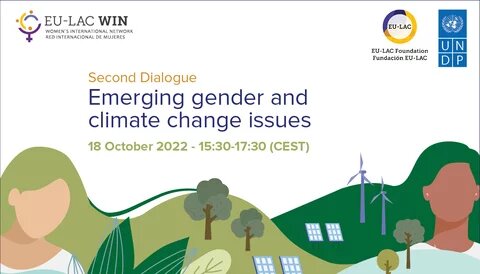Watch the recording of the webinar on YouTube!
The Foundation EU-LAC and the United Nations Development Program (UNDP) were pleased to announce the second Dialogue on Climate Action and Women, focusing on “Emerging issues in gender and climate change: just energy transition, electric mobility, nature-based solutions, climate resilience and gender-transformative risk management”. The event took place in a hybrid format within the framework of the 6th Ibero-American Summit of Local Gender Agendas.
The United Nations Development Programme's (UNDP) Human Development Report 2020 "The Next Frontier: Human Development and the Anthropocene" highlights that we live in an interconnected world, where social and environmental crises tend to feed on each other, generating vicious circles. Inequalities place women in a situation that reduces their capacity to respond and react to critical situations (resilience), and, in turn, the impacts of these crises tend to increase inequalities or create new ones. In this context, European and Latin American and Caribbean women, convinced of the importance of gender equality, human rights, the protection of nature and climate solutions, have promoted actions in favour of ambitious and transformative policies and solutions from different spheres.
The participants of the EU-LAC Women's International Network believe that it is urgent to discuss strategies to revise existing social contracts, address inequalities taking into account intersectional aspects and empower women as agents of change with the capacity to transform social and environmental spaces.
The series of dialogues were articulated around three main themes:
- Leadership and inclusion of women in decision-making on implementation of climate actions.
- Emerging issues in gender and climate change: just energy transition, electric mobility, nature-based solutions, climate resilience and gender-transformative risk management.
- The transition to just and low-carbon economies and new gender-transformative development models.
